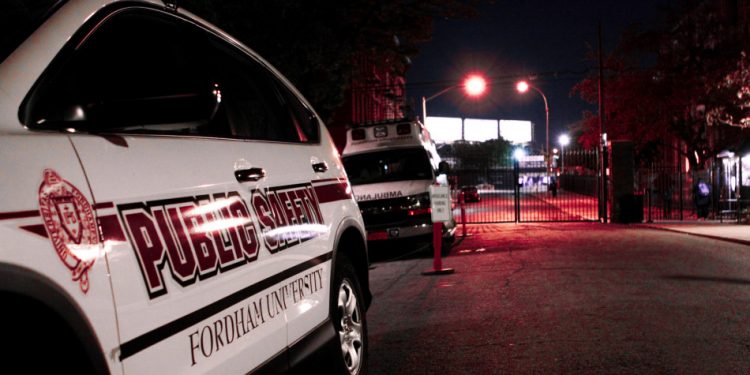In Keating First, co-keynote speaker Dr. Mark Chapman addressed over one hundred Fordham students and many others over Skype at Lincoln Center about the state of racism in America.
“Even in 2015 there seems to still be a stubborn refusal in a large section of this country to truthfully acknowledge the degree to which white supremacy continues to shape the policies, the economics, the institutions of our society from our schools to our criminal justice system to our entertainment industry and just about everything in between,” said Chapman.
At Lincoln Center, Dr. Angela O’Connell gave her keynote address on addressing racism from the standpoint of racial privilege.
“We are stuck in a phase where we reject the need for healing out of those we fear we’ve harmed,” she said. “We find ourselves in the repetitive loop of history and responding at best with inequality sustaining charity.”
The Undoing Racism Collective is comprised of a myriad of staff, students, faculty and administration from Fordham University that have undertaken the Undoing Racism training provided by the People’s Institute of Survival and Beyond. The group meets monthly to discuss how to put what is taught at the training in practice.
The teach-in, which simultaneously took place at the Rose Hill and Lincoln Center campuses, featured five sessions. They included the History and Groundwork of Racism, Internalized Inferiority and Superiority, Intersectionality and Social Justice at Fordham, Religion and the Movements for Racial Justice and Microaggressions and Becoming an Anti-Racist Institution. Approximately 350 people registered to attend the event, according to Dr. Jeannine Hill-Fletcher, a member of the collective and an organizer of the teach-in.
The teach-in was planned after Rev. Joseph M. McShane, S.J., president of the university, issued a Call to Dialogue on Race Relations in March 2015, preceding the racial bias incident that occurred in Martyrs’ Court Lalande earlier this year. According to Hill-Fletcher, it was founded in 2007 after members of the Dorothy Day Center and Campus Ministry felt that anti-racial training would be helpful in their work.
The speakers at the teach-in promoted keeping the conversation about racial interactions at Fordham at the forefront of key areas of Fordahm life, including hiring practices and admissions. Chapman addressed at length how diversity takes a back seat to more profitable enterprises in higher education.
“When there is the will of the institution to perform better on the playing field we will look for the best coach and play them a million dollars,” he said. “But when it comes to matters of inclusion and diversity there is a reluctance to translate that to concrete action.”
He encouraged the student body to expect more than just talk from administration about creating Fordham into an anti-racial institution.
“Until there is a very clear message sent from the top that we want a more diverse faculty and a more diverse student body and we are putting the resources behind this in order to make it happen, until that happens we are just having a thereputic conversation,” he said.
The address resonated well with Jimmy von Albade, FCRH ’17, who attended the session on Religion and Movements for Racial Justice.
“I thought what was really meaningful and important was how Dr. Chapman and Dr. O’Connell emphasized that those with more privilege can use that privilege to benefit others,” von Albade said. “It’s not enough to simply acknowledge the existence of privilege; you have the duty to leverage your own advantages in order to work towards racial justice for all.”
Hill-Fletcher told The Fordham Ram that the Collective intends to bring the dialogue generated at the teach-in to their next monthly meeting on Nov. 16th to discuss how Fordham could potentially form concrete action in the future.
“If our aim was to provide a context in which we could share some sense of history some elements of analysis and some common language to continue this work with a broader group from within Fordham then it was definitely a success,” said Hill-Fletcher.
“The success will continue to be measured by how much we continue this anti-racist work not as isolated individuals as a collective as a movement.”





